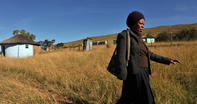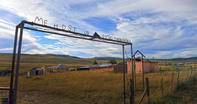Childhood Homes

We travelled to the Eastern Cape to find Felicia Mfamana, to see the area where several of the grandmothers of GAPA (Grandmothers Against Poverty and Aids) grew up. The arrangement was that Felicia would meet us outside the ABSA bank near the entrance to the village of Cofimvaba.
When we arrived, we saw a small, upright figure outside the bank. From a distance, it looked too young and fit to be one of the grandmothers. But the woman was wearing the purple mohair beret we had often seen Felicia wearing and, sure enough, it turned out to be her.
'Oh, I am so excited you have come,' she said, beaming, and introduced us immediately to a curious neighbour as she walked past. We drove our hired car up a long, bumpy track to the village where she lives. It is a remote place that locals cannot get to on Sundays, when the taxis do not run, or during the rainy season.
From her ancestral home, Felicia has an exquisite view of the valley in which her village lies. Her house is on a hill, the grasslands falling gently below. In the distance are the forests in which her daughter Nomanani gathers wood each week, bringing the bundle home on her head, and just beyond that are mountains.
Around her home are the rondavels of her village, painted turquoise, pink and yellow, those ubiquitous colours of villages of the Eastern Cape. There is silence except for the sound of birds in the grass, the rustling wind and, occasionally, the greeting of a neighbour passing by. The surroundings are glorious, but the Mfamanas, like so many others in the Eastern Cape, are extremely poor.
Torn Between Homes

Felicia has a family in Cape Town, as well as one here in the village, to help raise. She is split between the two. The section of Khayelitsha where she lives is very poor, her street densely packed with houses, and crime is rife, she says. Her heart is in her village, but the children in Cape Town need her, too.
Later, we took her to see her sister in a neighbouring village. When our car could go no further along the rutted road, we dropped her off. 'It's fine, it's not far at all,' she said, her face as bright as ever. We watched her walk down the hill, up another, fast and with determination, in the same sprightly, self-contained way we had become accustomed to.
She had a way to go yet, but as her figure became smaller in the distance we could still make it out, thanks to her purple mohair beret.
By Jo-Anne Smetherham